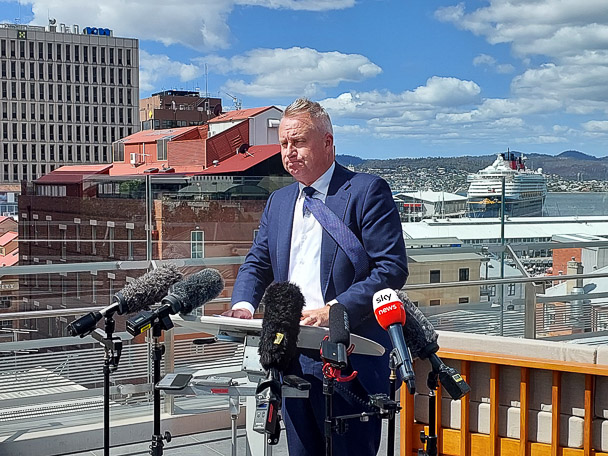Comment: Tasmanian Liberal government blocks journalists from media conferences

For the third time in three years, the Tasmanian Liberal government has taken steps to block Tasmanian Inquirer from asking questions at media conferences by deleting us from an email list used to alert journalists.
Without receiving the alerts, we have not been able to question government ministers on their track record or election policies.
The government’s media alerts stopped arriving on around February 1, well before the election was called. I made contact with three government spin doctors by email, phone and texts. A dozen attempts to resolve the issue made no difference. Once the election was called, the media email list passed over to the Liberal party. An email to Liberal State Secretary, Peter Coulson, requesting reinstatement also drew no response.
“Good leaders front up and answer the tough questions. Weak leaders try to avoid scrutiny, and questions from the media. How can you be Premier when you can’t even front for the tough questions.”
Deputy Premier Michael Ferguson
The government has a reputation for secrecy and being unwilling to embrace accountability. That it stoops to culling journalists that it doesn’t like from their alerts list is another clear example of this. It reeks of a desperation to avoid scrutiny, and willingness to punish those who simply ask uncomfortable questions the public deserves answers to.
The government knows that the public expects journalists to be allowed to scrutinise the government and other parties and candidates. It’s a key part of a functioning democracy.
A few days after Rockliff called the March 23 election, Deputy Premier Michael Ferguson wagged his finger at Labor leader, Rebecca White, for allegedly wanting journalists to confine questions to the policy announced at a media conference.
Ferguson accused White of “trying to dodge answering media questions” during an election campaign “when Tasmanians deserve answers so they can decide who to vote for … Tasmanians deserve better than this.”
“Good leaders front up and answer the tough questions. Weak leaders try to avoid scrutiny, and questions from the media. How can you be premier when you can’t even front for the tough questions?”
Ferguson makes a good point.
We see the government’s action as a backhanded endorsement of the importance of independent media outlets like Tasmanian Inquirer in holding politicians to account.
Tasmanian Inquirer has been playing this role for almost four years, during which our work has been cited in parliament and followed by other media. We may be small, but the impact of our work has been recognised with two awards at the Tasmanian media awards. (If you aren’t on our mailing list or a donor, you can sign up here and/or here.)
For the record, I am on the media alerts and media releases list for the Labor party, the Greens, independent candidates John Tucker, Lara Alexander and Sue Hickey, and others.
It is not the first time I have been dropped from the Liberals alerts list without explanation. After asking then-premier Peter Gutwein on the second-last day of the 2021 election campaign about the proposed pokies tax and political donations, I was mysteriously omitted from the alerts list. Once the election was over, I was quietly reinstated.
The next occasion I was blacklisted was after I asked Premier Jeremy Rockliff at a December 2022 media conference about his reported attendance at a $4400-per-head Liberal party fundraising event attended by salmon industry executives. I was reinstated in early 2023.
Tasmanian Times, another independent media outlet, is also no longer on the email lists for alerts and media releases. There may well be other journalists affected too.
The government’s action in excluding journalists is petty, but also raises a serious question: if this is how it treats journalists it doesn’t like, how does it treat those who have far less power and ability to publicise its actions?
Postscript: Following the publication of this story, Bob Burton contacted his union, the Media, Entertainment & Arts Alliance. On X, formerly known as Twitter, MEAA President Karen Percy wrote on X: "This is unacceptable, undermining the public's right to know & eroding media freedom. Journalists should have access to information, events, alerts - particularly during an election. Jeremy Rockliff TasLiberal Please overturn this decision now". In a separate Tweet, the MEAA stated "Tas Inquirer is an established part of the state's media landscape. It's unacceptable for the government to pick and choose the media who can attend their events."
The following day Tasmanian Inquirer was reinstated to the Liberal Party's email lists for alerts for media events. Initially, Tasmanian Times was not reinstated to either the list for events alerts or media releases. After Tasmanian Inquirer raised the omission with a government media adviser, Tasmanian Times was also reinstated.
 @BobBurtonoz
@BobBurtonoz